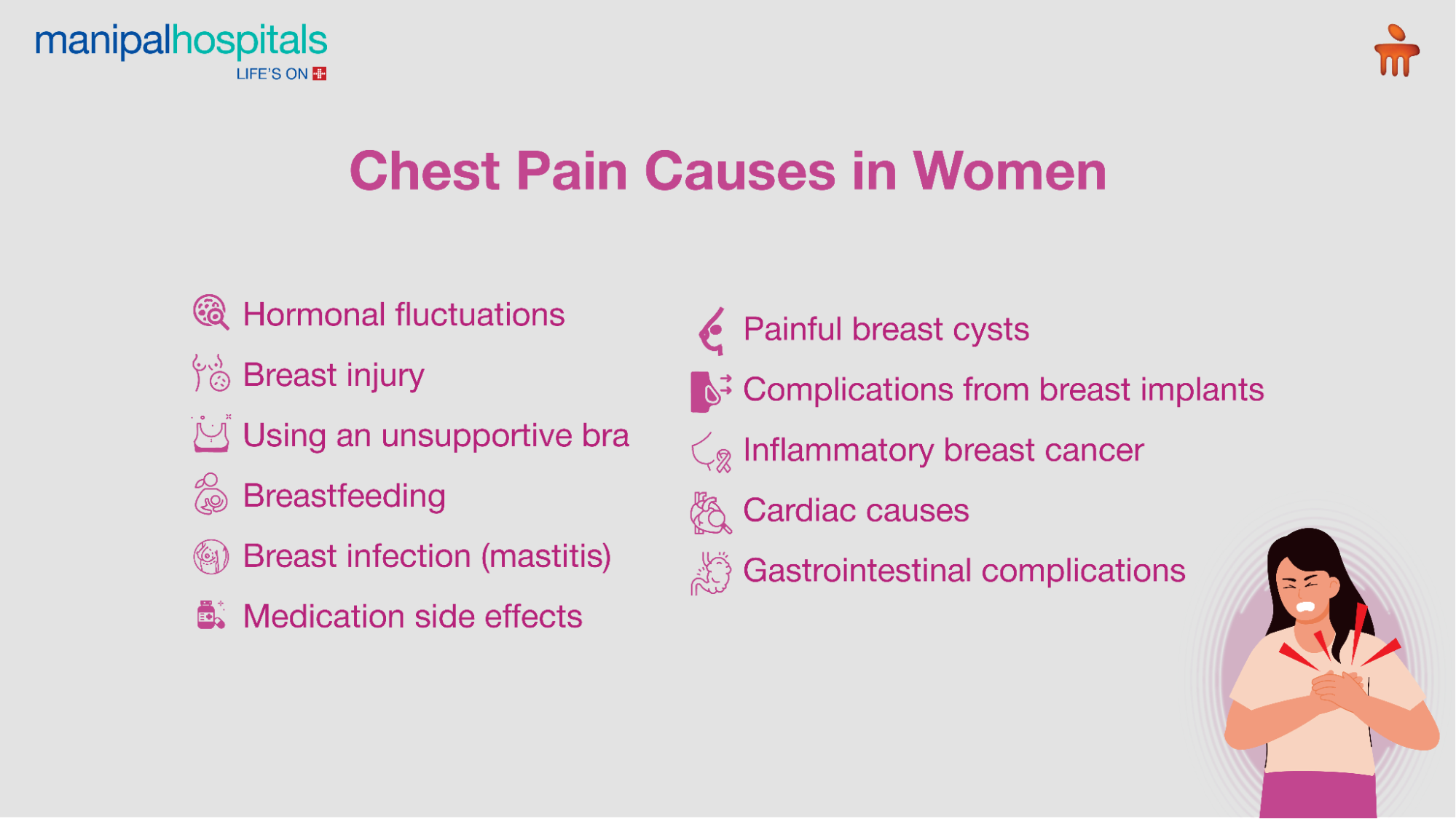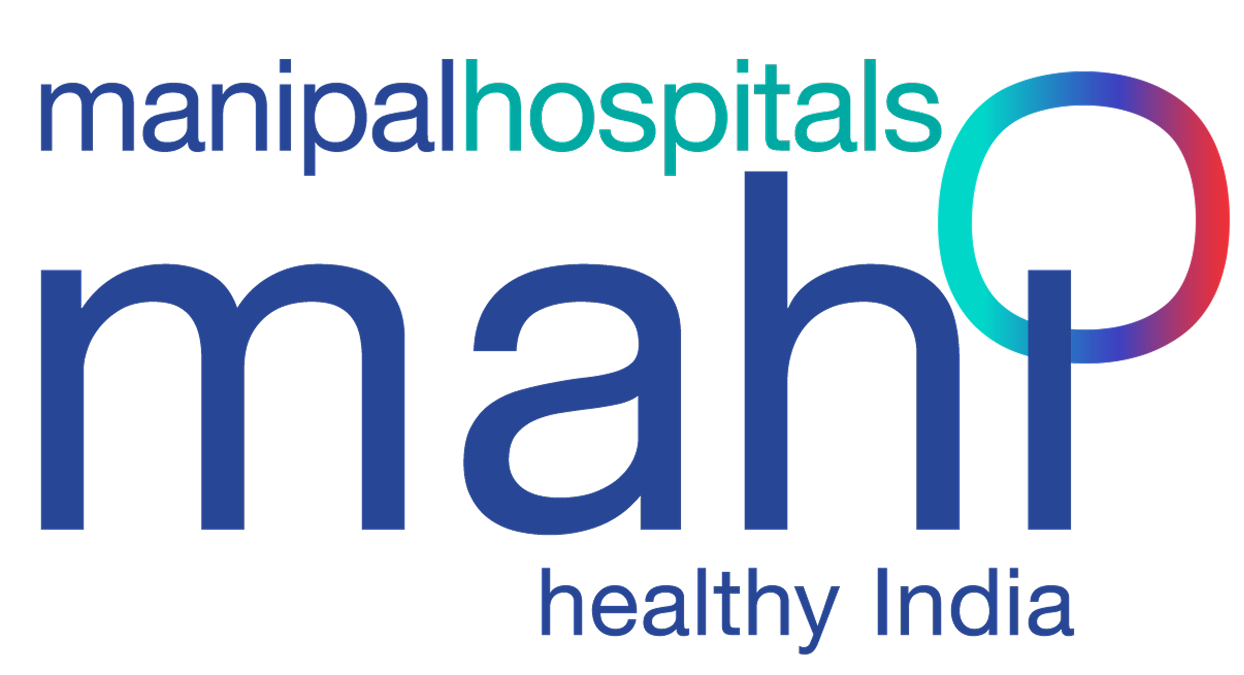
Breast pain, commonly referred to as mastalgia, often affects most women at some point in their lives. Almost 70% of women experience this pain during their lifetime.1 In India, 47.33% of women experienced mastalgia.2 Most breast pain conditions are mild and can be treated easily; lingering breast pain is a sign of a serious underlying medical condition. In this blog post, we will discuss the common chest pain causes, symptoms, and how to treat them.
Synopsis
What is chest pain in women?
Breast pain can be described as throbbing, stalling, sharp pain, or tenderness in the breast tissue that is constant or occurs occasionally. Frequent breast pain can interfere with an individual’s life and make it hard to go about their routine.
Types of breast pain
There are two types of breast pain:
Cyclic breast pain: The breast pain aligns with the woman's natural menstrual cycle and affects women between the ages of 20 and 50 years. The pain may develop in one or both breasts a week before menstruation due to changing hormone levels. The pain goes away once you get your period. Those taking hormonal medications can also experience this type of pain. Women experience tenderness, swelling, and heavy breasts.
Noncyclic breast pain: This type of pain is common in women older than 40 years or those with menopause. The pain does not have a pattern; it can come and go, be constant, or become chronic. Any breast injury or benign breast condition can cause this type of pain. Women experience acute pain in one specific area of the breast, which is often a burning or stabbing sensation.
Common Chest Pain Causes in Women

- Hormonal fluctuations
The main reason for breast pain in women is hormonal fluctuations. Due to the rise in oestrogen and progesterone levels during menstruation, the breast becomes sore 2 to 3 days before it starts. Pregnant women also experience breast tenderness or soreness during the first trimester as their hormone production ramps up.
- Breast injury
Any injury to the breasts because of accidents while playing sports or breast surgery can cause sharp, shooting pain in the breasts. The tenderness in the breasts can linger for a few days to several weeks after trauma to the breasts.
- Use of an unsupportive bra
When not correctly supported, the ligaments linking the breasts to the chest wall can become overstretched and uncomfortable, causing sore breasts, especially while exercising.
- Breastfeeding
Breastfeeding can sometimes cause painful nipples (due to improper latch or dry and cracked skin) and a tingling sensation while the milk flows. Consult a lactation consultant if you experience breast pain while breastfeeding.
- Breast infection (mastitis)
Breastfeeding women can occasionally develop breast infections along with pain, redness, and swelling. Typically, the infection is treated with antibiotics and painkillers.
- Medication side effects
Some medications can cause breast pain as a side effect. Common drugs that can cause breast pain are Oxymethone, Chlorpromazine, Diuretics, Hormonal Therapies (birth control pills, hormone replacement therapies, and infertility treatment), Digitalis, and Methyldopa.
- Painful breast cysts
A tender lump called a cyst may develop in the breast, which often does not need treatment and resolves independently. If the cyst causes symptoms, it can be drained.
- Complications from breast implants
Women who have had breast implants can experience pain if scar tissues form tightly around the implants or if the implants rupture. Getting in touch with your doctor can help resolve the issue.
- Inflammatory breast cancer
In rare cases, this type of breast cancer can cause redness, swelling, and pain. If you observe any of these symptoms, contact your doctor immediately.
- Cardiac causes
Chest pain symptoms in women can be an indication of a heart attack. In addition, they also experience shortness of breath, cold sweat, lightheadedness, nausea, and pain in both arms. The pain can last for a few minutes and then stop before starting again. Other cardiac chest pain causes in women are myocarditis, angina, cardiomyopathy, pericarditis, and aortic dissection.
- Gastrointestinal complications
In some cases, gastrointestinal complications like heartburn or gastroesophageal reflux disease, an inflamed gallbladder or pancreas, and gallstones can contribute to chest pain due to gas in women.
Treatment for breast pain in women
Cyclic or noncyclic breast pain in women is treated with pain-relieving medication, which is available over the counter or with a prescription. Specific treatment might be administered if the pain is due to an underlying cause. Additionally, adjusting the medication you take, wearing a well-fitting supportive bra, avoiding tobacco, and eliminating caffeine can help relieve breast pain.
Conclusion
Although breast pain can cause serious discomfort, it is not always a serious condition to worry about. Your healthcare provider will recommend the medications necessary and treatments to manage chest pain symptoms. However, if the pain lasts more than two weeks or becomes severe, you must get an evaluation done to understand chest pain causes. Visit Manipal Hospitals, Kolkata, for a comprehensive breast examination.
FAQ's
Most breast pain relieves on its own or with medication or lifestyle changes. However, if you experience any of the following chest pain symptoms, get yourself evaluated:
-
Fever
-
Discharge from nipples
-
Painful lump or mass
-
A sudden increase in pain
-
Pain in one particular area
-
Skin changes
Women with breast cancer do not always experience pain, but some may develop a sore or throbbing sensation in one particular area of the breast. Breast cancer can also cause changes in skin texture (dimple), make the area itchy and warm, and also cause nipple discharge.
Few studies point to a link between breast pain, anxiety, and stress. However, more established studies are required to fully understand the mechanism.
Women with breast pain experience difficulty sleeping and issues with sexual intimacy, or they may not be able to participate in high-impact exercises and activities.
You can schedule an appointment at Manipal Hospitals, Kolkata, by contacting us or visiting our website.
Visit: https://www.manipalhospitals.com/kolkata/
Contact no: 033 6907 0001






















 6 Min Read
6 Min Read





.png)








